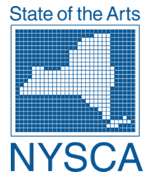I’ve lived in New York State since 1998 and somehow never realized that literary translators are eligible to apply for grants through NYSCA, the New York State Council on the Arts, through its Literature Program. I think this fact isn’t widely known, and there are reasons for this. For one thing, NYSCA is a New York State government agency that can fund individual artists only through a “fiscal sponsor,” a non-profit organization that will formally submit the application, disburse any grant funds and submit a final report following the expiration of the grant year. In other words, there is a level of bureaucratic complexity involved that a person like me might find daunting. But all literary translators who reside in New York State are eligible to apply for these grants, so I recommend a little persistence, particularly in the case of projects that already have publishers lined up, as these are the most likely to receive funding, though having a publisher is not at all a necessary condition for receiving a grant. Funded projects are often book-length, but shorter projects (a novella or collection of 10 or more poems) are eligible as well.
There is one category of translator for whom the NYSCA application process is relatively straightforward: translators with projects that will be published by presses or literary magazines that happen to have New York State non-profit status (such as Archipelago, Ugly Duckling Presse, BOA Editions etc.) These non-profit publishers are likely to have applied for NYSCA grants in the past and know how the application procedure works.
Other translators need not be discouraged, though. If you live in New York State, you qualify to apply for NYSCA funding as long as you are able to find a fiscal sponsor willing to submit an application on your behalf – even if your literary work (fiction, drama, poetry or literary non-fiction) will be published by a for-profit or out-of-state publisher or magazine, and even if you don’t yet have a publisher at all. Many different sorts of non-profits qualify to serve as fiscal sponsors for NYSCA grants: not-for-profit magazines and arts and cultural organizations, many of which are also likely to have submitted NYSCA applications before. There are even non-profits, like Fractured Atlas, that exist for the sole purpose of providing fiscal sponsorship to individual artists. So think about which non-profits you have professional relationships with – one of them may well agree to sponsor you – keeping in mind that each non-profit has to pick its battles: it’s apparently disadvantageous for one fiscal sponsor to submit competing applications in a single year.
The rewards of persistence in the face of bureaucratic hurdles can be significant: NYSCA awards several grants a year to fund translation projects, generally ranging from $2500 to $10,000, depending on the scope of each selected project and the available funds in a given year. Translation projects are most likely to be funded if they already have a commitment from a publisher and the translator has taken some care with the sample translation and supporting materials. Kathleen Masterson, director of NYSCA’s Literature Program, recommends that translators make a strong case for the importance of the work not only in its original language and context but also in terms of its relevance to New York State readers today. She also suggests that translators contextualize the samples they submit, e.g. indicating if a given passage is still an early draft of the translation or a near-to-finished product.
If you are interested in learning more about NYSCA grants, study the guidelines included on the Literature Program website, which also contains links that can be used to contact program officers for more help or information. In fact, it’s a good idea to download the guidelines right now for your reference, since there is sometimes a lag over New Year’s between when the old guidelines are taken down and the new ones posted. The application deadlines for next year’s competition (for grants to be disbursed during fiscal year 2015) have not yet been set, but it is likely that you will have to register your intention to apply early in 2014, with a final application deadline (via an online process) some time during the spring. These deadlines have a way of creeping up on you, so if you’re interested in applying for NYSCA funding, probably the best moment to start lining up a fiscal sponsor is now.



[…] aside from English PEN, you could start with the PEN / Heim Translation Fund Grant, the NEA, or NYSCA if you happen to be based in New York state. Know your project’s strengths and be ready to […]